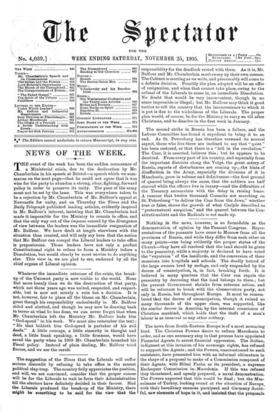T HE event of the week has been the sudden occurrence
of a Ministerial crisis, due to the declaration by Mr. Chamberlain in his speech at Bristol—a speech which we sum- marise on the next page—that he could not agree that it was wise for the party to abandon a strong, clear, fighting, forward policy in order to preserve its unity. The pace of the army must not be set by the lame. This was everywhere taken to be a rejection by Mr. Chamberlain of Mr. Balfour's appeal at Newcastle for unity, and on Thursday the Times and the Daily Telegraph published leading articles, evidently inspired in Mr. Balfour's interest, insisting that Mr. Chamberlain had made it impossible for the Ministry to remain in office, and that the only way out of the impasse caused by the divergence of view between the leaders was the immediate resignation of Mr. Balfour. We have dealt at length elsewhere with the situation thus created, and will only say here that the notion that Mr. Balfour can compel the Liberal leaders to take office is preposterous. Those leaders have not only a perfect Constitutional right to refuse to form a Ministry before a Dissolution, but would clearly be most unwise to do anything else. This view is, we are glad to see, endorsed by all the chief organs of Liberal opinion.




















































